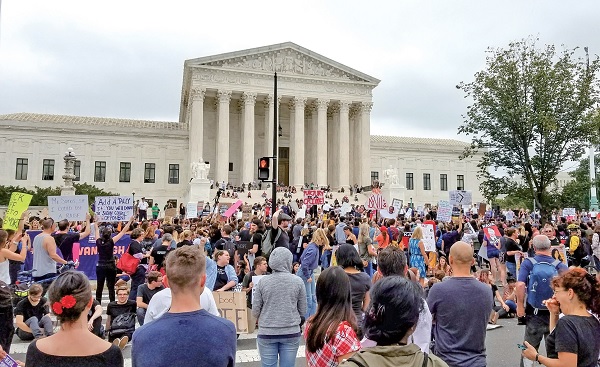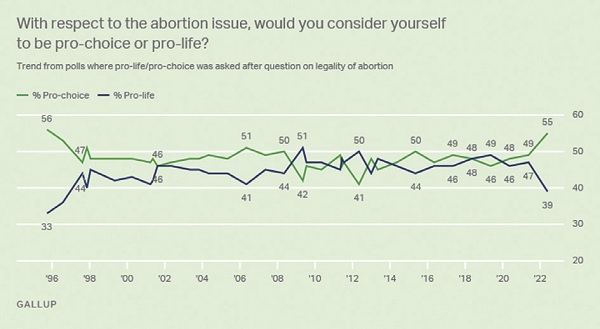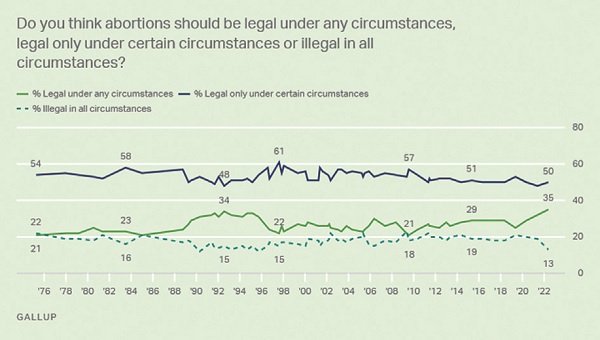The Absolute and Relative of Life
Let’s start with the controversy over women’s abortion rights in Roe v. Wade.
On June 24, 2022, the justices of the US Supreme Court ruled that Roe vs. Wade was officially overturned, declaring that women’s abortion rights, which had been guaranteed by the US Constitution for half a century, had officially come to an end. history.
In fact, in early May, Politico magazine exposed a draft of the majority opinion written by Justice Samuel Alito, which already showed that the Supreme Court may be preparing to overturn Roe v. Wade. This has caused women's abortion rights, which has been controversial in American society, to once again occupy the media and trigger fierce debates.
After the news of the verdict came out on June 24, the pro-life camp cheered loudly, and many people cried and prayed and thanked God; the pro-abortion rights camp protested fiercely, and many people took to the streets angrily, unable to accept such a result.
Where did the women’s right to abortion, overturned by the justices on June 24, come from?
Roe v. Wade Brief
Roe v. Wade was a 1973 abortion rights dispute in Texas. Norma McCorvey (Norma McCorvey, whose legal name is Jenny Rowe, hereinafter referred to as Rowe) had an unexpected pregnancy when she already had two children. She did not want to keep the fetus in her belly, but according to Texas law, only if the fetus is threatened Abortion can only be legal when it is necessary to save the life of the mother.
With the help of a lawyer, Luo filed a lawsuit with Henry Wade, the district attorney general representing Texas, accusing Texas law of violating her constitutionally guaranteed right to privacy. On January 22, 1973, the Federal Supreme Court ruled by a ratio of 7 to 2 that the Texas criminal law's restrictions on women's right to abortion violated the "Due Process" clause of the 14th Amendment to the U.S. Constitution. 1 1
最高法院解釋,婦女墮胎權屬基本人權,政府在決定是否干預時,應採「嚴格審查」(Strict Scrutiny)標準。 2 而德州法認定,基於保護懷孕婦女身體健康,維持醫療標準,及保護未出生胎兒的生命權,州可以主張「重要利益」(important interest),但因為保護未出生胎兒的生命,具不可抗拒利益(compelling state interest),州可藉由立法對婦女墮胎權做出一定的限制。
Based on the principle of equity, the Supreme Court proposed the "three-stage pregnancy standard" and believed that the growth of the fetus in the mother's womb is divided into three stages (trimester). In the first stage of the first three months (1-12 weeks), because the fetus cannot survive outside the mother (viability) alone, pregnant women have a high degree of autonomy and can decide whether to have an abortion after discussing with their doctor. In the second trimester after three months of pregnancy, the government must restrict abortion, but the decision must be made to protect the health of pregnant women.
In the third stage when the fetus can survive alone outside the mother's body (24-38 weeks), the government protects the interests of potential life to the extent of irresistible interests and prohibits abortion unless the life or health of the mother is endangered.
The Supreme Court found that the Texas statute banning abortion did not set different review standards based on the different stages of a woman's pregnancy, violating the "due process of law" requirement of Article 14 of the Additional Amendment to the Constitution. Later, some states interpreted "threat to health" more liberally, and women could choose abortion claiming "psychological burden", making the original so-called "restrictions" almost no longer exist. Women can have abortion at any stage and for any reason. Select "Terminate Pregnancy".
而2022年6月24日最高法院的判決,不只推翻羅訴韋德案,也推翻「計畫生育聯合會」訴凱西案(Planned Parenthood vs. Casey)。 3 引用美國憲法第十修正案允許各州自行決定墮胎是否合法,可能為各州實施更強硬的墮胎限制打開大門,包括禁止墮胎。
According to a survey by the Guttmacher Institute, after Roe v. Wade was overturned, as of press time, at least 25 states have restricted or banned abortion, 12 states have tried to protect abortion rights, and 13 states have banned and protected abortion. Rights and policies coexist.4

Pro-life or pro-choice?
Whether the right to abortion should be legal is a legal debate. Should we support the right to life of the fetus in the mother's womb (pro-life), or the mother's right to free choice (pro-choice)? What do you think? What about the average person’s opinion?
According to Gallup polls from 1995 to 2022 on the pro-choice or pro-life position of the American public, it can be seen that the number of people supporting life has increased significantly in the past 30 years, and in 2021 it is almost equal to the number of people supporting choice. But in 2022, the proportion in favor of choice jumped to 55%, and in favor of life it dropped to 39%.
Also based on the Gallup poll, a questionnaire on whether abortion should be completely legal, absolutely illegal, or conditionally illegal shows that 13% people think abortion is completely illegal; 50% people support conditional abortion legality; 35% people think abortion should be legal It should be completely legal (Figure 2 and Figure 3). 5 5


In response to the justice's decision on June 24 to overturn women's right to abortion, a YouGov survey showed that 50% people opposed the justice's decision, while only 37% people were in favor. 6 6
It can be seen that society and culture are more polarized, especially between the two major parties: 72% Democratic supporters opposed the justice's decision; 71% Republican supporters expressed support. After the justice's ruling, the decision on whether abortion is legal has been left to each state's laws to define sentencing. State parliaments are eager to try and gear up.
Before the justice's ruling was passed, companies including Starbucks, Tesla, Microsoft, and Amazon announced plans to fund interstate abortion arrangements for their employees, based on concerns that Roe v. Wade might be overturned. After the Supreme Court's ruling was passed on June 24, Disney, Meta, and Dick's Sporting Goods also announced that they would join the ranks of subsidizing employees' transcontinental abortions.
Is it illegal, or even criminally responsible, for these employers to fund cross-state abortions for their employees? How will company shareholders face company management’s support and funding of employee abortions? We can foresee one corporate governance debate after another.
The divergent opinions on the right to life and the right to choose are not only controversial about the abortion case, but also the determination of when life begins.
The right to life versus the right to choose
Since the release of the justices' opinion that may overturn Roe v. Wade, some friends have posted on Facebook with the general theme: "I don't support murdering babies - but I support Betsy; Betsy found her unborn child , did not generate life-sustaining organs"; "I support Susan; she is pregnant with the fetus of the person who sexually assaulted her"; "I support Teresa; she was unable to save the fetus in her belly due to premature detachment of the placenta, causing massive bleeding." ;"I support……". There are many other difficult circumstances that make it difficult for a woman to make the decision to keep her fetus.
When does life begin? Does the sovereignty of embryonic formation lie in the mother's womb, or in the hands of God who created all things? Is it from conception, as the Bible states, or is it the three-stage pregnancy standard of Roe v. Wade, where the mother can decide within three months of conception? The Bible mentions in many places that God has created us fearfully and wonderfully, has recorded our days in our mother’s womb, and has precious thoughts toward us (see Psalm 139:13-17). God’s eyes saw us before we were formed; God already knew us when we were created in our mother’s womb (see Jeremiah 1:5). Life is under the sovereignty of God; from beginning to end, it is under God's control. People think it is an "accidental" pregnancy, but there are no accidents in God's creation, only careful and unique plans.
If the embryo is the beginning of life, it should be protected by the law and given the right to life. The right to life blessed by God cannot be deprived because of another person's pain and uncertainty.

Absolute love conquers the relative world
Before writing this article, although I was against abortion, I did not want to judge Betsy, Susan, and Theresa who had to make painful decisions on this issue. They did make decisions under very forced circumstances. No matter how much I empathize with them, how can I truly understand their struggles and the challenges they must face in the future? How can I point fingers at them and judge what is right and wrong?
At this point in my writing, God’s Spirit was with me, and I began to examine myself—
If I believe that the embryo is the beginning of life, the beginning of a life that has been planned and blessed, then does another person have the right to end a life for any reason? As a Christian in this chaotic era, how can we sit back and watch this injustice and corruption?
In a broken world, many things slowly change from "absolute" to "relative"; from "absolute truth" to "relative truth." The law can only find relative solutions after weighing the interests of all parties. Only in God can the absolute answer be found. The Bible is the absolute truth. It is the absolute truth that life exists from the moment of conception. It cannot be deemed to be relatively non-existent just because another person is harmed, threatened, or in pain. But Betsy, Susan, and Theresa, their pain, helplessness, and threats are absolutely real.
The overturning of Roe v. Wade does not mean that abortion will come to a natural and complete end. It will mean more inconvenience and difficulty for many women who are in pain and do not know the truth. As pro-life Christians celebrate their "success" after years of fighting against abortion laws, are they willing to devote themselves to serving these confused women while loving the life of the fetus?
根據Care Net 2015年統計,十位墮胎的婦女中有四位是上教會的。 7 從探討教會和文化需要的福音派機構Lifeway Research研究指出,只有7%的婦女會和教會討論是否墮胎;76%的婦女認為,教會在她們決定過程中,不會影響她們的墮胎決定。 8
As a Christian, this shocked and deeply introspected me. The anti-abortion rights Susan B. Anthony List, a nonprofit working to reduce and end abortion in the United States, issued a statement pledging to increase support for the life safety net and challenge every legislative body. Build the strongest possible protection consensus for unborn children and women.
Can the law really give an absolute answer? In the political struggle and the whirlpool of money, women who are at a loss are still at a loss. While Christians are shouting in support of life, when faced with women who are hurt, helpless, confused, or do not know God’s absolute truth, can you and I be channels of God’s absolute love? Let these women know through practical actions: God created the fetuses in their wombs, and he also created them; the lives of fetuses are precious, and their lives are equally precious. No hardship can separate them from God’s love; God, who is full of kindness and mercy, has the sovereignty and power to reverse and redeem the mistakes made by man, and achieve results beyond what reason can imagine.
The abortion rights that we hope to be overturned by the Supreme Court will not only declare an end to an operation and rights, but also bring about an earth-shaking but peaceful cultural revolution in the United States, heading straight for the heavenly goal. Ask the Holy Spirit to open the eyes of you and me. Maybe the women sitting next to us during church worship are the Betsy, Susan, and Teresa that God wants you and me to serve. Do you and I have the courage to weep with her out of faith and love, and walk with her out of love? Because the absolute love of Jesus has overcome this broken and relative world. We must support those who run together. A blood-covered road leading to the hope of eternal life.
extendreadread:
•Relationship unit in issue 37 of this journal〈Come to her side - First Care Women's Clinic continues to impact lives〉.
• "The History of the Battle for Abortion Rights" (https://ceciyau.org/index.php/2022/06/13/history-of-the-battle-for-abortion-rights/), "Beyond the battle over "abortion rights"" (https://ceciyau.org/index.php/2022/06/13/across-the-battle-over-abortion-rights/), Qiu Qingping.
Note:
1. The principle of due process (due process). Countries in the Anglo-American legal system ensure that everyone has the right to safeguard their rights through legal procedures before being convicted, imprisoned, executed, or before private property is seized. The purpose of this principle is to try to find a balance between legal power and individual rights.
2. "Strict Scrutiny" is a type of judicial review used to determine whether a specific law is unconstitutional. Typically used when courts review cases where the government is being sued for discrimination.
3. In the 1992 case Planned Parenthood vs. Casey, the court ruled that states may not impose "imposition laws" on women seeking abortions before the fetus can survive outside the womb, which is approximately 24 weeks of gestation. "undue burden".
4. Guttmacher Institute Survey:https://states.guttmacher.org/policies/.
5. Gallup survey:https://news.gallup.com/poll/1576/abortion.aspx.
6. YouGov Survey:https://today.yougov.com/topics/politics/articles-reports/2022/06/24/american-opinion-supreme-court-abortion-roe-wade.
7. Care Net, a nonprofit organization that supports more than 1,100 pregnancy centers in North America. 2015 Survey:https://www.care-net.org/churches-blog/new-survey-women-go-silently-from-church-to-abortion-clinic.
8. Lifeway Research survey:https://research.lifeway.com/2021/12/03/7-in-10-women-who-have-had-an-abortion-identify-as-a-christian/.
Huang Qiwei, Doctor of Laws, specializing in U.S. commercial law and international commercial law. Students describe her in class as "tough but entertaining." Originally from southern Taiwan, now living in the suburbs of Pennsylvania. Enjoy serving God with your husband, son, and daughter; riding bikes, boating, riding waves, and basking in the sun together; and exploring small islands, fishing villages, and intertidal zones together. I love teaching and thank God for giving me the opportunity to serve on campus and witness life changes. Currently working in the Department of Global Affairs at the University of Pennsylvania (Penn Global). I still remember that at the KRC retreat many years ago, Professor Wen Yingqian encouraged and expected her to dedicate herself to the ministry of literature in the Kingdom of God. Now that I have fulfilled my wish, I dedicate this article to Professor Wen.













